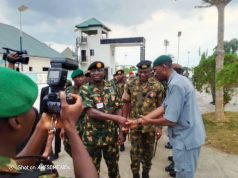Abdulrasheed Bawa’s transfer to the agency’s most prestigious bureau came amidst probe of his untidy involvement in depletion of confiscated assets.
he management board of the EFCC confirmed a controversial senior detective to a prestigious appointment despite a slate of unsettled corruption allegations and a cacophony of colleagues who cried foul over the potential damage the agency could suffer if it continues to reward questionable conduct within its ranks.
The anti-graft office asked Abdulrasheed Bawa to lead its field office in Lagos with effect from August 8, despite an active probe of his alleged theft of confiscated proceeds of ill-gotten loot at his previous appointment in Port-Harcourt, multiple sources briefed on the matter told Peoples Gazette.
Mr. Bawa was in-charge of the Port-Harcourt zonal office last year when dozens of petrol-bearing trucks that were confiscated from suspected looters were abruptly auctioned off to his proxies at “ridiculous prices,” sources said.
Three of his junior colleagues who were alarmed by the sheer mismanagement of priced public assets and other suspicious acts of Mr. Bawa’s took immediate steps to curb his excesses by filing anonymous complaints to the headquarters in Abuja, the Gazette understands.
He was subsequently arrested and detained for several days in Port-Harcourt before Ibrahim Magu, erstwhile head of the agency, ordered his transfer to the agency’s training school in Abuja pending conclusion of investigation.
The months-long investigation into Mr Bawa’s alleged corruption and a jarring crackdown on Mr Magu and other ex-senior officials of the EFCC were yet to be concluded when he was tapped for the top job in Lagos, a development that underscores how arbitrary power, unmoored to a transparent standard, can propel individual careers in a frightening miscarriage of justice.
“The government said Magu and others were arrested and flushed out to save the EFCC from institutional damage,” an official said. “But how can you secure people’s confidence if you only trade one crooked officer for another?”
Five anti-graft officials who spoke with the Gazette for this story wished to remain anonymous, citing their active engagement status and a lack of clearance to speak to journalists on a matter that was still under investigation. The Gazette agreed not to identify them in accordance with its policy on anonymous sources.
‘Loot re-looted’
Mr. Bawa was accused of selling at least 244 trucks worth between N20-30 million each to his proxies at N100,000, or slightly more, per unit.
A proxy sold one of the tankers to a businessman in Ibadan for N14.8 million, officials said, lamenting that the businessman has been evading invitation and the agency is reluctant to declare him wanted in order not to draw public attention to the investigation.
Officials said Mr. Bawa’s handling of the trucks had deprived the Nigerian people of at least N4.88 billion in potential loot recovery.
“If you take a conservative approach and multiply the trucks by N20 million each, even though some were far above that price, you will arrive at N4.88 billion for the 244 trucks he sold out,” a senior EFCC official said. “So Bawa is being compensated for ensuring that nearly N5 billion did not go into the public treasury.”
EFCC’s overhead for 2019 was N3.6 billion, which was also enough to cover its staff strength of 4,962, officials said.
Procedurally, recovered cash and assets are returned to the public coffers upon conclusion of forfeiture proceedings in court. While some of the 244 trucks have been declared as proceeds of corruption by the Federal High Court, the Gazette learnt that forfeiture proceedings on most of them have yet to be concluded before Mr. Bawa sold them off.
For nearly two weeks, Mr. Bawa declined multiple requests for comment from the Gazette for this story.
Wilson Uwujaren, chief spokesman for the EFCC, said he could not provide information on the status of the probe and the decision of moving a subject of an active investigation to Lagos.
“Since the issues of assets are already before the presidential panel, for now we cannot comment on those things,” Mr. Uwujaren told the Gazette on Thursday afternoon.
But in January, Mr. Uwujaren defended Mr. Bawa’s action publicly, saying there was no wrongdoing in the sale of the trucks. Nonetheless, he said in the same statement that a probe had been ordered into the suspicious auction.
Name dropped
Mr. Bawa, a deputy chief detective superintendent, was first confronted by Ola Olukoyede, then EFCC secretary, about the whereabouts of petrol tankers that were under forfeiture by Port-Harcourt zonal office in late 2019, multiple sources, including one official who was present, told the Gazette.
Ola Olukoyede, EFCC secretary on suspension from office. He investigated the controversial sale of recovered assets [Photo Credit: EFCC Twitter Account]
Mr. Olukoyede had received complaints that Mr. Bawa was tampering with seized assets that were still undergoing forfeiture proceedings in court. It is illegal to take possession of a citizen’s assets without a due process, which involves getting a federal judge to declare such assets as proceeds of public loot.
“He was asked to explain what happened to over 240 trucks that the zonal office was trying to secure their forfeitures,” a source said. “But he was unable to explain.”
The source said Mr. Bawa initially told Mr. Olukoyede that he got the directives to sell the trucks from Mr. Magu, but he declined to write that claim in his statement.
“It turned out that he was just dropping names, or he was trying to protect Magu,” a source said. “He refused to write it in his statement that it was Magu who sent him.”
The source said Mr. Olukoyede immediately called Mr. Magu, who was away on an official trip at the time, with details of what transpired in Port-Harcourt. After concluding his findings, Mr. Olukoyede returned to Abuja, expecting Mr. Magu to take action upon his return from the trip.
Mr Olukoyede, who has since been suspended from office as part of the raging presidential probe, declined comments for this story.
When he returned, Mr. Magu made an urgent trip to Port-Harcourt, and Mr. Bawa was removed as the zonal head the next day.
“He was ordered to be detained in Port-Harcourt for several days,” another source familiar with the matter said. “He was then asked to report at the training school in Abuja, which we thought would be the end of his career.”
Mr. Magu did not return a request for comment. But in its January statement, the EFCC said Mr. Magu did not benefit from the controversial sale of the trucks, but instead allowed a transparent process to play out.
‘Unmerited and highly political’
Anti-graft detectives, mostly deputy chief detective superintendents, said they thought posting Mr. Bawa to the training school, known as ‘Siberia’ amongst personnel, would take him out of circulation.
They were, however, “disappointed” when a posting circular on August 8 said he had been transferred to Lagos.
An internal memo confirms Mr. Bawa’s transfer to Lagos on August 8, 2020.
“We saw him on the list as the new head of Lagos office, and everyone revolted,” the source said. “But our revolt was a quiet one.”
As a member of the elite ‘Course 1’, EFCC’s first set of cadets now mostly at grade-level 13, Mr. Bawa has flaunted his association with Mr Magu, and once acclaimed himself ‘anointed leader’ of the so-called ‘Magu Boys’, sources said.
Mr. Magu led the EFCC from November 2015 until his disgraceful ouster on July 7. He was accused of grossly enriching himself while arresting and prosecuting other Nigerians for graft.
Although a government panel that was raised to hear the charges has yet to return its recommendations, Mr. Magu strongly denied all corruption and abuse of power allegations and asked his lawyers to file court processes aimed at clearing his name.
Still, serving EFCC officials who believe Mr. Magu deserved his inglorious exit said his collaborators within the anti-graft office should have equally suffered a similar fate.
But rather than being affected by his ties to Mr. Magu, Mr. Bawa has instead been propelled to the very job he had deemed beyond reach, his colleagues said.
“He was a don of Magu Boys,” one of his colleagues said. “But he thought his career had finished when he was caught in Port-Harcourt, detained for days and later transferred to the EFCC training school in Karu.”
The EFCC’s zonal office in Lagos is seen as the agency’s main hub of operations, earning a long-standing dread as the nemesis of advanced-fee crooks, corporate racketeers, money launderers and other economic criminals in the commercial capital.
Mr. Bawa’s elevation as the head of Lagos zone, ‘de-facto vice-chairman’ as officers described it to the Gazette, stemmed from his foamy political ties than fortitude, sources said.
Despite being a close associate of Mr. Magu’s, Mr. Bawa managed to maintain a working relationship with Abubakar Malami, Nigeria’s controversial attorney-general who spent years waging supremacy war against the former head of EFCC, according to two EFCC officials familiar with his dealings.
“He was friends with both enemies,” an official said. “It is now clear that his transfer to Lagos is unmerited and highly political.”
Mr. Malami, himself a subject of multiple corruption claims he has denied, finally realised his plans to remove Mr. Magu from office after years of confrontation. He has since taken over the activities of the anti-graft agency and is believed to be behind a slate of policy changes aimed at undoing Mr. Magu’s legacy.
Both Mr. Malami and a spokesperson for his office did not return requests seeking comments about the attorney-general’s relationship with Mr. Bawa.
‘Joke of the year’
The EFCC has been Nigeria’s most prominent bulwark against endemic corruption since it was introduced by President Olusegun Obasanjo in 2003.
Since inauguration, its successive heads have been dogged by the spectre of being disgraced out of office, often on allegations of corruption they were detailed to combat.
From Nuhu Ribadu and Farida Waziri to Ibrahim Lamorde and Mr. Magu, every leadership has been mired in controversies. Shortly before his removal from office in 2015, the Nigerian Senate said Mr. Lamorde had mismanaged over $5 billion in public funds. He denied the allegations as a smear campaign.
Fatima Ibrahim, an anti-corruption activist, said the EFCC cannot be taken seriously if its leadership cannot stay above temptation.
“It is now very important that they focus on fighting corruption within their ranks,” Ms. Ibrahim said, decrying Mr. Bawa’s appointment as “an insult to Nigerians.”
“They have promoted someone who has been under investigation for corrupt practices to lead an anti-corruption drive,” Ms. Ibrahim said. “This would be the joke of the year but for its serious ramifications for the country.”
Muhammadu Buhari became Nigeria’s president in 2015 on the back of a promise to check corruption, but his government has continued to wither from one corruption scandal to another.
Other than Messrs. Malami, Magu and Bawa, Mr. Buhari’s top administration secretary, Babachir Lawal, was disgraced out of office in October 2017 after being exposed for stealing funds earmarked for displaced victims of Boko Haram.
Mr. Lawal’s dismissal came months after Mr. Buhari had spent months exonerating the then-secretary to the government against federal lawmakers who wanted him fired and prosecuted for the theft, later widely dubbed as the grass-cutting scandal.
“For a government that keep repeating its unproven bona fides on corruption, there have been too many corruption scandals under this government for anyone to take it seriously,” Ms. Ibrahim said.
Senior aides regularly dismiss criticism that Mr. Buhari’s anti-corruption strategy is a ruse, saying the president does not hesitate to remove, and sometimes recommend for prosecution, any official found with tangible claims of theft or abuse of power.
It was not immediately clear whether or not the presidential panel probing alleged corruption and abuses at the EFCC was aware of Mr. Bawa’s ongoing probe. A spokesperson for the panel did not return a request seeking comments







